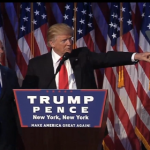Donald Trump has won the U.S. election and will be the next President of the United States.
He was the outsider who won in the teeth of opposition from the Republican Party, in the midst of a vicious electoral campaign, and in the midst of a world order that is changing every day.
This has both domestic and international consequences.
Domestically, it means that the political establishment in Washington DC, and in the U.S. – whether Republican or Democratic, has been demolished. Vested interests, from the lobbyists who dominate policy-making in Washington on everything from tax exemptions to intellectual property to defence industry interests, will lose their importance. Instead, the normal wheels of an administration and governance will have to lubricate themselves and begin to move virtuously.
This was the change that was set in motion by Steve Forbes in his first run as Republican candidate for President in 1995, when he based his campaign on the aim to wipe out the vested interests in Washington by imposing on the citizen a flat 17% tax. Forbes did not win, and the idea of the flat tax for America was buried. But with the Trump win, new, anti-establishment ideas will be back on the table.
This is a major change. According to an article in the Atlantic Monthly published last year[1], corporate lobbyists alone spend an estimated $2.6 billion a year in Washington, more than the $2 billion annual expenditure of the U.S. government[2] on the House and Senate. This is apart from the other public interest groups, unions and political action committees that exert an influence over US law and policy-making. This means that corporations and vested interests rather than political and development considerations – were leading domestic and international policy-making in the U.S.
Trump knows the system well, having been a participant and beneficiary of lobbying. His instinct, while on the campaign, tapped into that vast base of Americans who were the losers of the corporate conquest of America, and the multinational moves that globalised finance and the trade in goods and services. His job is to turn his attention back to people, and give them back their dignity through jobs, not handouts, and restore their national pride
Internationally, Trump’s win will be part of a global trend, where electorates are voting in non-dynastic leaders who are spearheading the establishment of the new post-World War II Order – Prime Minister Modi in India, President Vladimir Putin in Russia, President Erdogan in Turkey, President Xi Xingping in China. Hurichan Islamoglu, a political economist at Bogazici University in Istanbul, says the world is entering a new era of proactive governments of market societies. “It hopes to resolve issues of corruption – evident from Prime Minister Modi’s move on November 9 to demonetise the currency[3] and clear out India’s massive black money problem – and mediate the adverse effect of markets on large segments of the established middle class and generate a dynamic for the promotion of a new middle class,” she says.
Trump will also be wise to make good on his promises of American “withdrawal” from the international order[4]. This doesn’t mean that America will disappear from global affairs, of course, as the literalists made out. But it does mean that Trump understands that the world has become lopsided due to the lack of reform of international institutions,[5] with the ones established in 1945 being way past their full-usability date.
So expect the U.S. to become more amenable to reform of the UN, the World Bank and IMF[6], to new and more equitable global commodity benchmarks[7], to be open to a new definition for NATO, and as expected, be less antagonistic to Russia which has successfully been at the forefront of the fight against ISIS in West Asia. A less militaristic, less interventionist America is surely a good thing. So will the Rise of the Rest, i.e. regional organisations with collective bargaining power, which will provide geopolitical balance.
There are critical junctures in human history. The end of World War II in 1945 was one of them. The U.S. election of 2016 is another landmark moment for world affairs – and hopefully, a positive one.
Manjeet Kripalani is Co-Founder and Executive Director, Gateway House: Indian Council on Global Relations, Mumbai, and was Deputy Press Secretary to Steve Forbes during his first run in 1995-96 as Republican candidate for U.S. President in New Jersey.
This article was exclusively written for Gateway House: Indian Council on Global Relations. You can read more exclusive content here.
For interview requests with the author, or for permission to republish, please contact outreach@gatewayhouse.in.
© Copyright 2016 Gateway House: Indian Council on Global Relations. All rights reserved. Any unauthorized copying or reproduction is strictly prohibited
References:
[1] Drutman, Lee, ‘How Corporate Lobbyists Conquered American Democracy’, The Atlantic, 20 April 2015, < http://www.theatlantic.com/business/archive/2015/04/how-corporate-lobbyists-conquered-american-democracy/390822/, (Accessed on 9 November, 2016)
[2] Congressional Research Service, Government of the United States, Legislative Branch: FY2015 Appropriations, < http://fas.org/sgp/crs/misc/R43557.pdf>, (Accessed on 9 November, 2016)
[3] Patil, Sameer, ‘Pre-election flood of fake currency’, Gateway House: Indian Council on Global Relations, 31 March 2014, < https://www.gatewayhouse.in/pre-election-flood-of-fake-currency/>, (Accessed on 9 November 2016)
[4] Kripalani, Manjeet, ‘Populism as a threat to the UN’, speech delivered at Harvard Model United Nations India Leadership Forum, Hyderabad, 13 August 2016, < https://www.gatewayhouse.in/populism-a-threat-to-the-un/>, (Accessed on 9 November 2016)
[5] Deo, Neelam and Aditya Phatak, ‘Dismantling the geopolitical Bretton Woods’, Gateway House: Indian Council on Global Relations, 31 March 2016, <https://www.gatewayhouse.in/dismantling-the-geopolitical-bretton-woods/>, (Accessed on 9 November 2016)
[6] Mathur, Akshay, ‘The new multilateral financial architecture’, Gateway House: Indian Council on Global Relations, 1 April 2015, <https://www.gatewayhouse.in/the-new-multilateral-financial-architecture/>, (Accessed on 9 November 2016)
[7] Mathur, Akshay, ‘Reassessing Brent benchmark for crude oil’, Gateway House: Indian Council on Global Relations, 7 December 2013, <https://www.gatewayhouse.in/reassessing-brent-benchmark-for-crude-oil/>, (Accessed on 9 November 2016)


